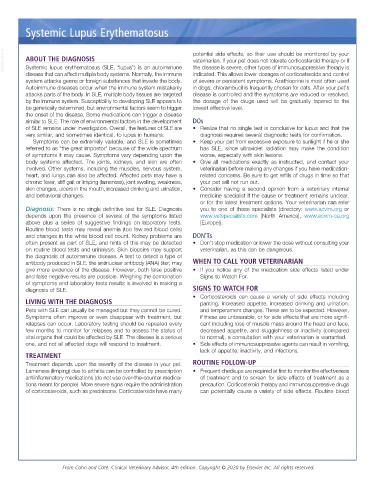Page 3132 - Cote clinical veterinary advisor dogs and cats 4th
P. 3132
Systemic Lupus Erythematosus
VetBooks.ir ABOUT THE DIAGNOSIS potential side effects, so their use should be monitored by your
veterinarian. If your pet does not tolerate corticosteroid therapy or if
the disease is severe, other types of immunosuppressive therapy is
Systemic lupus erythematosus (SLE, “lupus”) is an autoimmune
disease that can affect multiple body systems. Normally, the immune indicated. This allows lower dosages of corticosteroids and control
system attacks germs or foreign substances that invade the body. of severe or persistent symptoms. Azathioprine is most often used
Autoimmune diseases occur when the immune system mistakenly in dogs; chlorambucil is frequently chosen for cats. After your pet’s
attacks parts of the body. In SLE, multiple body tissues are targeted disease is controlled and the symptoms are reduced or resolved,
by the immune system. Susceptibility to developing SLE appears to the dosage of the drugs used will be gradually tapered to the
be genetically determined, but environmental factors seem to trigger lowest effective level.
the onset of the disease. Some medications can trigger a disease
similar to SLE. The role of environmental factors in the development DOs
of SLE remains under investigation. Overall, the features of SLE are • Realize that no single test is conclusive for lupus and that the
very similar, and sometimes identical, to lupus in humans. diagnosis requires several diagnostic tests for confirmation.
Symptoms can be extremely variable, and SLE is sometimes • Keep your pet from excessive exposure to sunlight if he or she
referred to as “the great impostor” because of the wide spectrum has SLE, since ultraviolet radiation may make the condition
of symptoms it may cause. Symptoms vary depending upon the worse, especially with skin lesions.
body systems affected. The joints, kidneys, and skin are often • Give all medications exactly as instructed, and contact your
involved. Other systems, including the muscles, nervous system, veterinarian before making any changes if you have medication-
heart, and lungs can also be affected. Affected pets may have a related concerns. Be sure to get refills of drugs in time so that
chronic fever, stiff gait or limping (lameness), joint swelling, weakness, your pet will not run out.
skin changes, ulcers in the mouth, increased drinking and urination, • Consider having a second opinion from a veterinary internal
and behavioral changes. medicine specialist if the cause or treatment remains unclear,
or for the latest treatment options. Your veterinarian can refer
Diagnosis: There is no single definitive test for SLE. Diagnosis you to one of these specialists (directory: www.acvim.org or
depends upon the presence of several of the symptoms listed www.vetspecialists.com [North America], www.ecvim-ca.org
above plus a series of suggestive findings on laboratory tests. [Europe]).
Routine blood tests may reveal anemia (too few red blood cells)
and changes in the white blood cell count. Kidney problems are DON’Ts
often present as part of SLE, and hints of this may be detected • Don’t stop medication or lower the dose without consulting your
on routine blood tests and urinalysis. Skin biopsies may support veterinarian, as this can be dangerous.
the diagnosis of autoimmune disease. A test to detect a type of
antibody produced in SLE, the antinuclear antibody (ANA) titer, may WHEN TO CALL YOUR VETERINARIAN
give more evidence of the disease. However, both false positive • If you notice any of the medication side effects listed under
and false negative results are possible. Weighing the combination Signs to Watch For.
of symptoms and laboratory tests results is involved in making a
diagnosis of SLE. SIGNS TO WATCH FOR
• Corticosteroids can cause a variety of side effects including
LIVING WITH THE DIAGNOSIS panting, increased appetite, increased drinking and urination,
Pets with SLE can usually be managed but they cannot be cured. and temperament changes. These are to be expected. However,
Symptoms often improve or even disappear with treatment, but if these are unbearable, or for side effects that are more signifi-
relapses can occur. Laboratory testing should be repeated every cant including loss of muscle mass around the head and face,
few months to monitor for relapses and to assess the status of decreased appetite, and sluggishness or inactivity (compared
vital organs that could be affected by SLE. The disease is a serious to normal), a consultation with your veterinarian is warranted.
one, and not all affected dogs will respond to treatment. • Side effects of immunosuppressive agents can result in vomiting,
lack of appetite, inactivity, and infections.
TREATMENT
Treatment depends upon the severity of the disease in your pet. ROUTINE FOLLOW-UP
Lameness (limping) due to arthritis can be controlled by prescription • Frequent checkups are required at first to monitor the effectiveness
antiinflammatory medications (do not use over-the-counter medica- of treatment and to screen for side effects of treatment as a
tions meant for people). More severe signs require the administration precaution. Corticosteroid therapy and immunosuppressive drugs
of corticosteroids, such as prednisone. Corticosteroids have many can potentially cause a variety of side effects. Routine blood
From Cohn and Côté: Clinical Veterinary Advisor, 4th edition. Copyright © 2020 by Elsevier Inc. All rights reserved.

